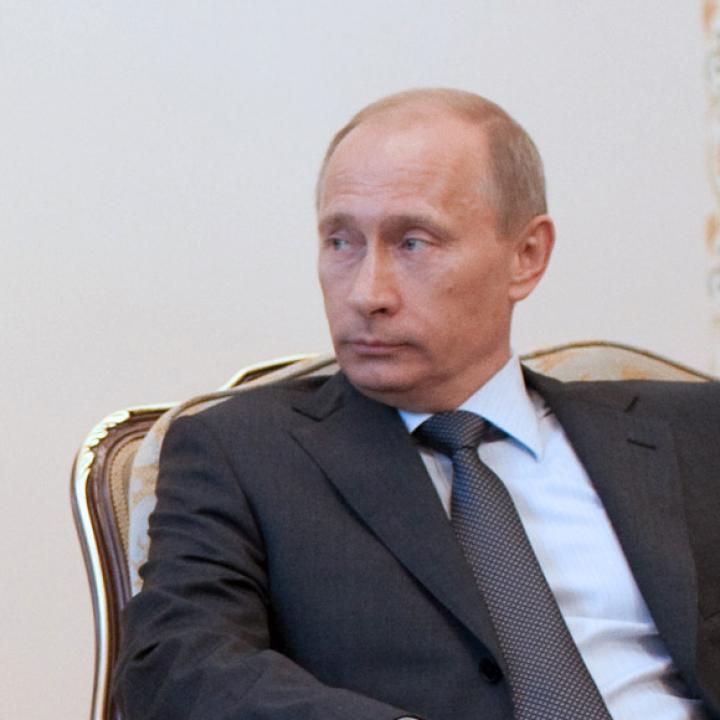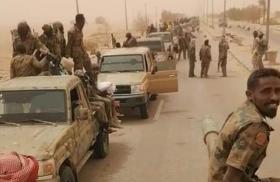

Contrary to expectations, Russia's positions on Iran and Syria are unlikely to harden during Putin's third presidential term, which starts next week.
Some analysts believe that Vladimir Putin's May 7 return to the presidency will inevitably lead to a toughening of Moscow's position on two key issues: the Iranian nuclear program and potential intervention in Syria. The worst scenario put forth so far implies an unholy alliance with Tehran and complete moral, military, and political support to Bashar al-Assad's regime in Damascus. Such speculations are rooted in the popular perception of Putin as a hardliner whose tense relations with the West are supposedly the product of an ex-KGB officer still seeking revanche for the Soviet defeat in the Cold War. Yet these negative expectations seem exaggerated. On March 7, journalists asked Putin whether his accession will change Moscow's approach to Iran and Syria. The answer, delivered in his typically curt style, was a short, promising "no."
WAS HE EVER ACTUALLY GONE?
As prime minister under Dmitry Medvedev, Putin often declared that it is the president, not the premier, who determines Russia's foreign policy. Indeed, Medvedev seemed to enjoy freedom of action during his tenure, adopting a somewhat liberal approach marked by a reset in U.S.-Russian relations, a degree of rapprochement with EU countries, compromise with the West on Libya, and serious cooling of relations with Tehran. This contrasted sharply with Putin's presidential terms, which are well remembered for active tensions with Washington and substantial improvement in Russo-Iranian dialogue in 2007-2008. Nevertheless, there was a strong feeling that Prime Minister Putin remained omnipresent behind the scenes.
First of all, the main players responsible for the formulation and implementation of Russian foreign policy during Medvedev's term were Putin appointees. These included influential presidential aide Sergei Prikhodko, Foreign Minister Sergei Lavrov, Foreign Intelligence chief Mikhail Fradkov, and others.
Second, even as prime minister, Putin sought formal control over any political issues within his legal reach. Such was the case with the Bushehr nuclear plant and the presence of Russian nuclear industry behemoth Rosatom in Iran. Sergey Kirienko, the company's chief, personally reported to Putin regarding construction of the Bushehr plant and, in November 2011, received the prime minister's blessing to continue cooperation with Iran on other nuclear projects.
Third, Putin never completely rejected the notion that many foreign policy decisions were in fact made with his express involvement. In March, for example, when he said he would not change Russia's course on Iran and Syria, he also noted that even though the president determines foreign policy, key questions are still discussed within the Security Council. He added that he and Medvedev were in agreement on the main issues despite certain differences.
NOTHING PERSONAL, JUST BUSINESS
To be sure, Putin is very cautious and critical about the United States and NATO, calling the latter a Cold War atavism on more than one occasion. He is also quite rational, however, as is Russian foreign policy. This rationality will likely prevent any real confrontation with the West regarding the Middle East, as well as forestall any deep Russian alliance with Damascus and Tehran under the present circumstances. Thus, in a recent meeting with Russian parliamentarians, Putin disappointed those deputies who expected tough anti-Western statements on Syria and Iran. Instead, he asserted that Moscow will not repeat the Soviet-era mistake of supporting any regime or country for ideological reasons, without cost-benefit calculations.
Currently, there are no evident benefits that would justify Russia allying with Tehran or Damascus. Both Medvedev and Putin clearly realize that their country would pay a great price in international opprobrium should it deviate from the consensus regarding those regimes. Moscow has spent years building strong ties with the United States, the EU, and Arab states (particularly the Gulf Cooperation Council), and neither leader is ready to sacrifice prospective political and economic ties with these countries for the sake of Ayatollah Khamenei or Assad.
In fact, some of Russia's most recent moves have already proven that Moscow wants to be a team player rather than a pariah. In mid-April, during the P5+1 talks in Istanbul, Russian officials demonstrated their readiness to cooperate on resolving the Iranian nuclear issue. And recent Russian actions on the Syria front -- such as criticizing Assad's excessive use of force, urging Gulf monarchies to begin a dialogue on the crisis, hosting Syrian opposition figures in Moscow, and supporting Kofi Annan's UN ceasefire initiative -- show that Moscow does not want to completely ally itself with Damascus, and that it expects international appreciation for this reluctance.
The reasons why Moscow does not want to fully support the Western coalition against Syria and Iran are also quite practical, and do not depend on the personal preferences of a president. Given the outcomes in Iraq and Libya, Russia has learned that the fall of longtime partners inevitably leads to the loss of economic and political influence in said countries. Whether Russia stays out of the conflict (as in Iraq) or unobtrusively helps to overthrow its old allies (as in Libya, where Moscow was the first government to stop exports of military equipment to Qadhafi), the result is the same: Russia has been compelled to leave countries liberated from dictators.
Therefore, without solid guarantees regarding the security of its interests, Russia has been fighting hard for Syria (one of its last stands in the Arab Middle East) while protecting Iran from the prospect of military strikes. Russia also values Tehran's help in promoting peace and stability throughout the Caspian littoral and Central Asia, in trying to limit the presence of third countries in regional affairs, in counteracting human and drug trafficking, and in deterring the spread of internal revolutions.
MINOR CHANGES ARE POSSIBLE
On the surface, at least, Russia's stance on Syria and Iran will probably undergo certain negative changes. Putin is a populist, and he will definitely try to shore up his domestic support by catering to nationalists and others who are angry about the liberal course of Medvedev's foreign policy, implying more-aggressive Russian rhetoric on these issues. Yet such rhetoric is typically aimed at the domestic audience and does not influence the main principle of Russian diplomacy: the readiness to discuss and negotiate. The real degree of Russian cooperativeness in the Middle East will therefore depend on the West's willingness and ability to negotiate the key issues. Appropriate guarantees that preserve Russia's interests in Syria and Iran -- coupled with a nonconfrontational approach to dialogue -- would probably have the most positive influence on Moscow.
Nikolay Kozhanov is a visiting fellow at The Washington Institute. From 2006 to 2009, he served as an attache at the Russian embassy in Tehran.



